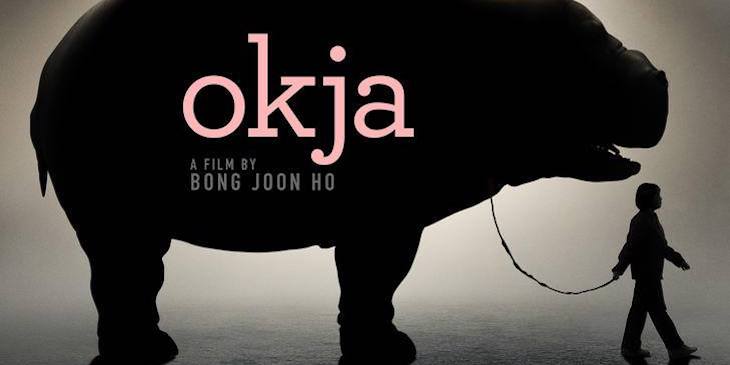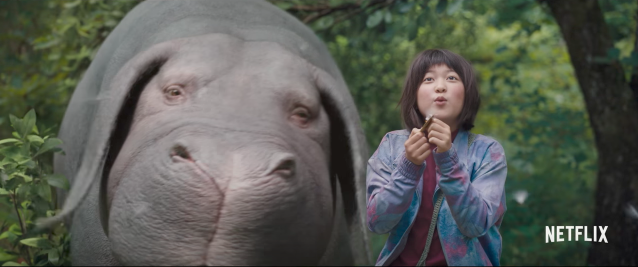Okja: The Film That's Inspiring Viewers to Examine Their Biases and Go Vegan
Spoiler alert: This post touches on different parts of the movie that may ruin the experience for those who haven’t watched it yet.
Okja is a super pig genetically engineered to be unnaturally large in order to feed the world’s growing, unsustainable population. Sound familiar? It’s almost immediately evident from the beginning of the movie that its fictional aspect lies mainly in the adorable computer-generated mutant pig, while its parallels with reality is the driving force and haunting message of the film.
In essence, Okja is every factory farmed animal in our world today (minus the fact that she gets to live on a remote mountaintop for the first ten years of her life, unlike real farmed animals imprisoned in cramped, windowless pens with no room to turn around). Although the film’s writer-director Bong Joon-ho, a South Korean filmmaker, didn’t set out to create an exposé on the horrors of factory farming or a social commentary on people's hypocrisy, apathy and cruel nature (greed, yes), the outcome turned out to be just that. It left many viewers to reconsider their diets and search online about veganism and vegetarianism. Just take a look at people's comments and social media posts about the movie and you'll see the overwhelming trend in people declaring they want to go vegan or have gone vegan since watching Okja.
Okja's Themes: Intentional and Unintentional
What Bong did want to focus on is capitalism and how we’ve forced animals into a grotesque “mass-production system.” He wanted to examine how distorted our relationship with animals has become, and even touches on the idea that the only difference between animals we see as food and animals we see as friends is our perception--though he never explicitly says that. In an interview with VICE, he said a lot of the inspiration for the movie came from a Korean TV show and its portrayal of the relationship between people and animals:
“On the one hand, they're like our family when they are pets. But on the other hand, if you've been to the supermarket, you can see they're sold in parts as feed products. And these two aspects coexist without much friction. But in the viewpoint of the animal, it's the same animal, but some get to be the family or friends of humans, and some have to end up as their food. And I wanted to portray this from the viewpoint of an animal.”
Animals bred and killed for food really are no different from those we consider our family or friends. They're just unfortunate to have been born in the form of what majority of the world perceives as food.
Asking the Hard Questions Non-Vegans Have Tried to Ignore
For non-vegan viewers, the film raises questions like: Where does friendship end and food begin? How can one root for the super pig yet continue eating meat? What makes Okja any different from other animals like chickens, cows and pigs slaughtered for food? How can one cringe and shudder at the various forms of abuse and exploitation of Okja when the film depicts the same cruelty that real farmed animals face in the same industry one supports when he or she consumes meat, dairy and eggs?
Perhaps the reason many people have been inspired to change their diet is because the story effortlessly evokes empathy; people can relate to having an animal friend (like a dog or cat) and would be heartbroken if that same friend were suddenly taken from them to be killed for food. One review said that Okja is different from the pro-vegan documentaries that have already created a niche category on Netflix in that it doesn’t come off as preachy or judge-y; yet it begs viewers to reexamine their long-held beliefs and actions when it comes to the food they eat. He says that Okja works because it's a story, and people "like stories with morals, not lectures."
Okja Gives Slaughterhouses Glass Walls
I’ve always had a tough time watching animal-related movies no matter how far-fetched and unrealistic the story was; I couldn’t bear to see an animal endure any form of tragedy or abuse. This was even before I became vegan (yeah, my cognitive dissonance was in full effect). Now as a vegan, I hesitated to watch Okja because I knew I couldn’t reassure myself by repeatedly saying, “It’s OK, it’s just a movie” whenever unbearably sad scenes played out. I’ve seen enough undercover investigations of slaughterhouses to know that the cringe-worthy scenes and graphic violence depicted in Okja actually happens in real life. It isn’t just a movie; with the exception of the CGI super pig, the slaughterhouse scenes realistically portray the standard practices in animal agriculture.
In fact, in order for the story to ring true to life, the film’s creator wanted to experience firsthand the true horrors of slaughterhouses by visiting one in Colorado, which was "five times bigger than a soccer stadium." Bong told VICE that the experience was so traumatic and shocking, he couldn't even get "one-tenth of the detail of the real slaughterhouse into the film." The putrid smells, the gore, the vicious abuse and abject suffering that farmed animals endured there were enough for him to abstain from eating meat for two months. Then sadly, his cognitive dissonance settled back in and he was once again swayed by his meat-eating culture.
I give Bong props for standing his ground and not letting the studios influence the storyline. Apparently, the studios wanted a typical whimsical movie about a girl and her animal friend without the dark, gruesome slaughterhouse scenes. Thanks to Netflix who gave Bong total freedom to do whatever he wanted with his film—rightfully so—he was able to include the ugly truth about animal agriculture.
An Accidental Gift for Farmed Animals and the People Fighting for Them
Okja is a happy accident in the sense that Bong Joon-ho never really intended for it to be the activism film that it’s now being labeled as by many film critics and animal rights activists. He simply wanted people to know where their food comes from, and at its core, it was supposed to be a movie about a girl and her friendship with a special pig. Yet Okja seems to be awakening and inspiring viewers to take a hard look at their cognitive dissonance and shun meat--albeit only temporarily for some. One review even says that “Okja is to factory farming as to [sic] Blackfish was to SeaWorld!”
This film could turn the tide on our collective conscience, and be the hope for the more than 56 billion farmed animals killed for food each year, who never experienced the love and loyalty that protagonist Mija had for Okja.

